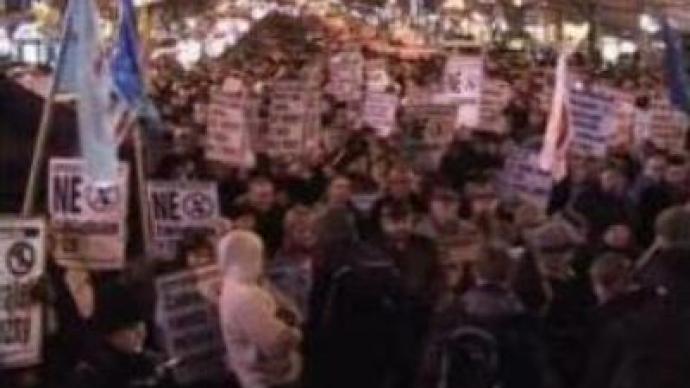Czechs to protest U.S. plans to deploy missile defence system

Hundreds of people have gathered to demonstrate against U.S. plans to deploy a defence base in the Czech Republic. It was another round of protests, following a mass demonstration in Prague on Monday.
In January the U.S. announced it wants to build a missile defence system in Eastern Europe. The plan involves deploying a radar base in the Czech Republic and missile interceptors in Poland. Washington says defence units are needed in the area to counter threats from Iran, North Korea and what it calls other 'rogue regimes'. The proposal, however, has caused mixed reactions. Czech Prime Minister Mirek Topolanek supports the move, despite public opposition. On Monday, hundreds of demonstrators gathered in Prague's Wenceslas Square to protest against hosting the base. People fear involvement in the US military plans will make their country a target. The Czech opposition are condemning the move, and calling for a nationwide referendum. On Firday, European Parliament members from the Czech Republic and Poland formally requested the EU Council to clarify its position. ‘Both Poland and the Czech Republic are members of the European Union and NATO. A decision on participating in such a programme should be made from the perspectives of these organisations. Should the programme prove necessary security-wise, we need to act together and include other countries, for example, Russia in discussing the matter,’ Libor Roucek, European Parliament member commented. The EU Council could take as long as six months to respond. In the meantime the Czech Government is planning to begin talks with Washington. The final decision on the issue will require the Parliament's approval which is already split over the issue. But with the Czech population also wanting to be heard, the U.S. defence ambitions remain in the air. Russia has already voiced strong criticism of the U.S. intentions. Russia's Foreign Minister Sergey Lavrov says deploying bases in the Czech Republic and Poland is not the answer to international threats. Andrey Ionin from the Center For Analysis of Strategies and Technologies joined Russia Today to talk about the issue. ‘I’d like to say that even if the decision of Poland and the Czech Republic will be made this year, the construction of the base will be over in 2012, not earlier. We should talk about not the existing threats, but the threats in the future. What exactly those threats are, we should ask them. ’ the analyst commented.The expert also spoke about possible U.S. motives. 'There are several possible motives behind what the U.S. does. Maybe the real motives are only known to President Bush and Condoleezza Rice. But I can think of several motives, several reasons for what is going on, and there’s only one motive that really helps to increase the strategic stability in the world. I don’t know why neither the U.S. nor Russia names this reason. The reason is that those anti-missile bases will protect not the U.S. but its allies in Europe, the NATO members in Europe, from individual missiles from Iran or North Korea aimed not at the U.S. territory but at Europe. Then it does make sense and increases strategic stability. All the other reasons of such a decision (base deployment) are negative and have negative consequences for Russia. There are quite a few reasons like that. I can briefly list them. Firstly, if we consider Russia’s strategic nuclear forces, we can say that this kind of defensive system is not going to work against a massive attack by the Russian nuclear forces. Of course, 10 missiles located in Poland won’t be effective. However, if we imagine that Russia was attacked first and then responded with several remaining individual missiles, this kind of defensive system can be effective. From this point of view, their step might show aggressive intentions. However, there are other explanations. For instance, the U.S. might deploy some intelligence facilities at the base. An analog , let’s say, of the Russian secret base in Lurdas on Cuba. No one will be allowed access to the base and it can spy on what’s going on in Russia, even outside Moscow. Also, it might be a U.S. political game against its old NATO partners, indicating that their help is not needed since the U.S. has new partners now, who are willing to deploy such strategic facilities on their territory. By the way, Great Britain has refused to deploy the anti- missile base, whilst Poland is likely to agree. There are other motives, too. However, as an expert I should say the are mainly negative,’ Mr. Ionin said.
You can share this story on social media:












